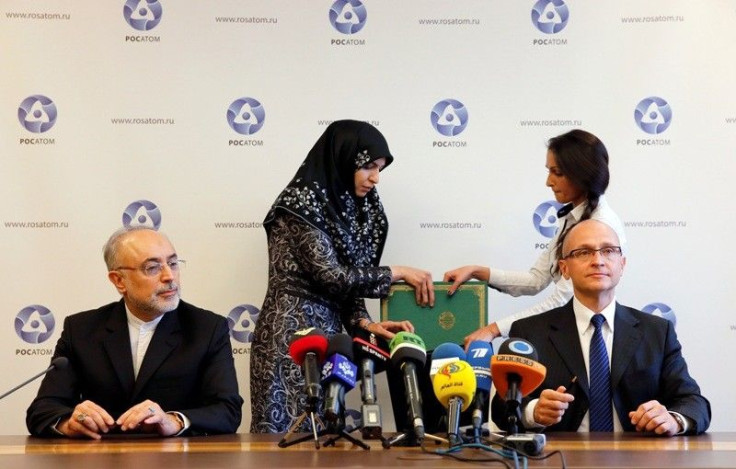Iran’s Missile Programme Bigger Threat, Says US Law Maker Mike Turner Even As Data Confirms Heavy Compromise By US To Stitch The Deal With Iran

Criticism is rising on the frame work deal reached between the United States and Iran regarding the latter’s nuclear program. Senior Law maker and Republican leader Mike Turner said even as the U.S. is working to prevent Iran from developing a nuclear bomb, it is failing in the crucial task of extracting protection from the latter's lethal missile program.
Turner, a votary of missile defence, chairs the Armed Services subcommittee that authorises procurement, research and development. Leading a bipartisan delegation, he visited Israel and Romania recently and had meetings with Israeli leadership including Prime Minister Benjamin Netanyahu and heard out its concerns. The main concern is-- Iran’s efforts at destabilising the Middle East “have not ceased.”
Iran’s Missile Program
Turner said the chief concern is that the talks with Iran were not focused on the missile threat and added “the fact that we could be facing relatively soon an Inter Continental Ballistic Missile equipped Iran without any intervention from the administration is a concern.” Turner’s trip to Romania was focused on missile defense and there he evaluated progress of the new missile defense base. A similar one is coming up in Poland, and it will be operational by 2018. Russia has raised strong objections to the missile defence sites, which are mainly to shield the U.S. and European allies from short and intermediate-range ballistic missiles from rivals including Iran and other rogue states.
Turner is credited with his fight for earmarking $20 million towards the development of the missile defense system, citing Russia as a factor in expediting the project. “The ballistic missile threat is evolving. It’s becoming more sophisticated. The problem with missile defense is now that it’s proven its worth and people are actively working to circumvent it," Turner observed.
US Stand Diluted
Meanwhile, the Hill carried a report on the framework deal with Iran that seeks to freeze its nuclear program for more than a decade. It noted that despite all the tall talk by the White House on many of its positions, the end-deal has showed that there has been a marked from President Obama's goals, pronounced at the start of negotiations, 18 months ago. But, Democrats and the White House dismissed those changes as the result of tough negotiations.
But Republican critics say the administration proffered too many concessions and went too far without getting anything tangible in return. The report identified at least four areas where the administration's change of stand was glaring, during the negotiations:
Uranium enrichment: Before talks began, the Obama administration called up Iran to stop all uranium enrichment. But the framework agreement allows Iran to continue the enrichment of uranium and produce plutonium for domestic civilian use. Omri Ceren, senior advisor for strategy at the Israel Project, noted the administration started "sliding" on zero enrichment after talks started. Hiwever, Reza Marashi, research director at the National Iranian American Council and a former State Department official, said the U.S. budged for the sake of talks to advance.
Capping of Centrifuges: The Obama-administration had proclaimed that it would persuade Iran to limit the number of centrifuges for uranium enrichment to 1,500. But the U.S. negotiators hugely retracted, allowing Iran to keep 6,104 centrifuges with 5,060 of those centrifuges at the nuclear facility at Natanz, for enriching low-grade uranium. But, critics say Iran would have four times as many centrifuges as Obama hoped to allow. But proponents of the deal portray it as success with two-thirds reduction from Iran's current 19,000-some centrifuges. Also, any enriched uranium would be unusable for a bomb.
Shuttering Nuclear Facilities: The U.S. initially called for Iran to completely close down its secret underground nuclear enrichment facility at Fordow and heavy water reactor at Arak. President Obama said in December 2013 that , “they don’t need to have an underground, fortified facility like Fordow in order to have a peaceful nuclear program. They certainly don’t need a heavy-water reactor at Arak in order to have a peaceful nuclear program." However, the framework deal allows for the retention of both Fordow and Arak. Sceptics say Iran could continue its work covertly as Fordow is underground and heavily fortified.
Ending ballistic missile program: The U.S. negotiators also dropped demands that Iran must restrict development of ballistic missiles that may be used to deliver warheads. But the framework says a UN resolution would incorporate “important restrictions on conventional arms and ballistic missiles.” The Obama administration distanced itself from its earlier position by saying that missiles and other conventional weapons should be "treated separately" from the nuclear deal.
(For feedback/comments, contact the writer at kalyanaussie@gmail.com)





















